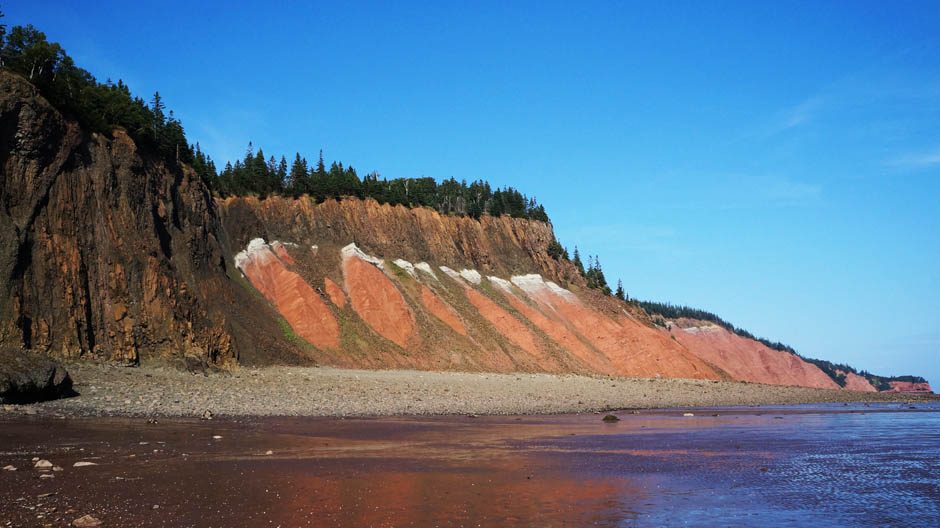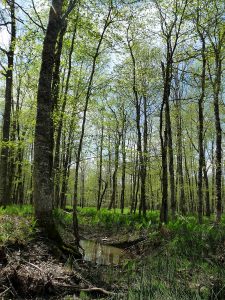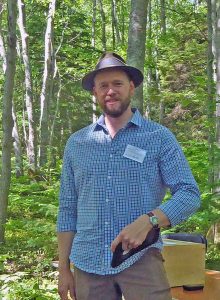From Nov 18, 2016 on
Carbon Opportunities Conference in Port Hawkesbury, Nova Scotia March 7 & 8, 2018
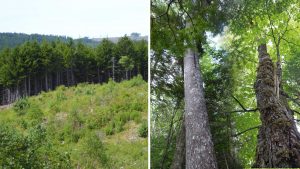
Choices: two approaches to forest management in Nova Scotia; one could benefit financially from carbon offsets AND conserve biodiversity, one would not
Speakers and topics are cited on a website for the conference, led off by none other than Prof Peter Duinker of the Independent Review! He spoke recently to a Senate Committee about forests and climate change and a lot else.
Nine speakers are listed currently including Dale Prest who has been highly active in promoting carbon offsets as an income generator for private woodlot owners in Atlantic Canada (see recent post) and has urged the NS Government to adopt a cap and trade system that openly trades with markets in Ontario, Quebec and California.
So it should be an interesting conference, the Independent Review Report will have been completed, if not released, and there will likely be lots of discussion about it and the future direction of forestry in Nova Scotia. There is a $60 registration fee.
View Conference Website
May 4, 2017. Part 5 in the Cap and Trade, Panel Series: Resource Economies
Sponsored by EAC. “A panel series on developing Nova Scotia’s cap-and-trade system
Nova Scotia will implement a cap-and trade system in 2018. Join moderator, Dr. Meinhard Doelle, and panelists for a series of six free panel events on developing Nova Scotia’s cap-and-trade system.” Part 5 will be in Wolfville, place TBA.
May 2, 2017 in New Glascow: Rehabilitation of the Appalachian Deciduous Forest
Nova Scotia was a mosaic of different forest associations that reflected differences in rock, soil, climate and First Nations management. While a large portion of the landscape was covered with Red Spruce, the Atlantic coastline was boreal with Black and White Spruce, and well-drained uplands of Cape Breton and the Cobequids and fertile floodplains were hardwood associations. These hardwoods are northern extensions of the Appalachian Deciduous Forest and they change with climate change. The fertile floodplain portion of this Forest contains various rare elements and floodplain rehabilitation at a provincial level should be part of a continental plan to facilitate and conserve biodiversity as species distributions change and adapt to new habitats. At a local level, forest rehabilitation along rivers has the added benefits of mitigating flooding, improving water quality and wildlife habitat, and stimulating recreation opportunities
Speaker: Nick Hill, Fern Hill Institute for Plant Conservation
Place: Community room of the New Glasgow Library, 182 Dalhousie St.
Time: 6:30 p.m.
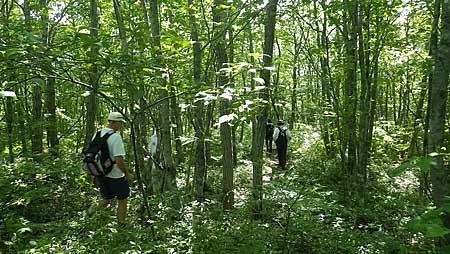 Monday, March 27, 2017: Nature’s Symbiotic Symphony
Monday, March 27, 2017: Nature’s Symbiotic Symphony
Presentation by Norris Whiston to NS Wild Flora Society. All welcome.
NS Museum of Natural History, Summer Street, Halifax 7:30 p.m. (Enter by Parking Lot entrance.)
Earth came with all the essential elements needed to foster life, but – it has taken a very long time and many biological transformations to make those elements into useable elements to foster the Earth’s current wealth of biodiversity. This presentation will cover a portion of the changes to Earth’s atmosphere, soils, and waters that have allowed our present life forms to exist. The presentation will also give some of the various roles many flora and fauna play in ecosystems and the effects of current human activities on those ecosystems.
View NSWFS for more details
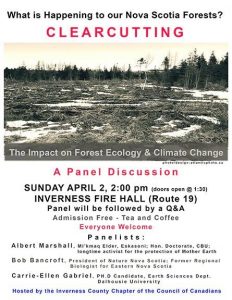
Sunday, April 2 , 2017 (Moved from March 5, 2017): Clearcutting: The Impact on Forest Ecology & Climate Change
Panel Discussion followed by Q & A
UPDATE APRIL 26, 2017: VIDEO AVAILABLE COURTESY NEAL LIVINGSTON: VIEW VIDEO
2pm at Inverness Volunteer Fire Hall (Route 19), Central Avenue, Inverness, NS
Tea & Coffee Served
Everyone Welcome
Panellists:
Albert Marshall is a Mi’kmaq elder from Eskasoni who has a long history of activism in the protection of Mother Earth. Albert and his wife Murdena developed the concept of Etuaptmumk, or Two-Eyed Seeing, and founded the Integrative Science programme at Cape Breton University based on this philosophy of combining Mi’kmaq and Western scientific knowledge. Albert is the recipient of an Honourary Doctorate from Cape Breton University.
Bob Bancroft is the president of Nature Nova Scotia, former Regional Biologist for Eastern Nova Scotia, and operator of a wildlife/forestry consultancy. He is a frequent contributor to CBC Radio, and was inducted into the Nova Scotia Forestry Hall of Fame in 2013.
Carrie-Ellen Gabriel is a PhD candidate at Dalhousie University’s Earth Sciences department. The focus of her research examines the destabilization of soil organic matter in the characteristic soils of the Acadian forest in response to forest harvesting, as well as the effects on carbon storage.
April 22, 2017: Medway Community Forest AGM
“Join us for our 2017 AGM and Conference on April 22 from 10-3 in the North Queens Business Hub in Caledonia at the rear of the firehall building. The conference portion of the meeting will take place in the morning and will be open to the public, and lunch will be provided for all attendees. We will be featuring speakers in the morning that will be touching on topics including the Seven Mile Lake Fire, non-timber forest products, new business opportunities in the MCFC and the future of the pilot project from the perspective of DNR. Our regular AGM for members will be held from 1-3.” North Queens Business Hub
9793 Highway 8 Caledonia, Nova Scotia B0T1B0 More details
Saturday Jan 21, 2017: Firewood, Wildlife and the Well Managed Forest
Presentation by Bob Bancroft to The Nova Scotia Firewood Club
2:00 p.m. at the Tantallon Library.
“Bob is a well-known, popular guest on CBC Radio Noon. He was an extension (education) biologist, editor, and fisheries biologist before leaving the provincial civil service in 1999. Currently president of Nature Nova Scotia, Bob led a scientific panel in 2009-2010 that was asked by government to make recommendations for a new forest strategy
Read more in The Masthead News
Dec 4, 2016 Forestry Forum Inverness (Council of Canadians)
2-4 pm at Inverness Fire Hall
Inverness Fire Hall, 15797 Central Avenue, Inverness, Nova Scotia
Panelists:
Andrew Fedora, Port Hawkesbury Paper
Kari Easthouse, Nova Scotia Landowners & Forest Fibre Producers
Allan Eddy, Associate Deputy Minister, Nova Scotia Department of Natural Resources
Sam Ainsworth, horse logging forestry operator
Bob Bancroft, president of Nature Nova Scotia, former Regional Biologist for Eastern Nova Scotia
Records of the event: Full Audio, Excerpt 1 (video), Excerpt 2 (video)
Monday Nov 28, 2016 Will Martin: How the sharing economy can enable good forestry and why that’s really important for conservation goals
Presentation to Nova Scotia Wild Flora Society. All welcome. 7:30 p.m. at Nova Scotia Museum of Natural History, 1747 Summer Street, Halifax.
This talk will explore how existing timber markets often make more sustainable forestry practices in Nova Scotia impossible and how new economic patterns emerging through web technology may unlock these challenges in a powerful new way. Dubbed “the Sharing Economy”, new internet platforms are helping people all over the world share information and build cooperative markets that can actually outcompete even the largest incumbents. By telling the story of launching WoodsCamp.com, Will is going to highlight how it may be possible to use this approach to solve some of the most intractable problems in how we manage our forests. Will is co-founder of WoodsCamp Technologies Inc. Co-chair of the Medway Community Forest Co-op, and a past president of the Nova Scotia Woodlot Owners and Operators Association. More details at www.nswildflora.ca/programme.html
Thursday Nov 24, 2016 Discussion on the past and future of Nova Scotia’s Forests
Thursday, Nov. 24 at 7 P.M. at Beacon United Church Parlour. Donna Crossland will be giving a presentation on Nova Scotia Forests: How they once were, and how they should be managed, based on natural disturbances and a desire for an ecologically sustainable future. Read more on TREPA
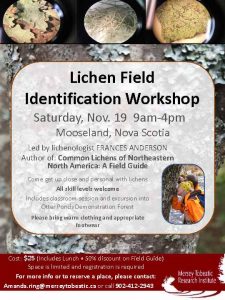 Saturday Nov 19, 2016 Lichen Field Identification Workshop (MTRI)
Saturday Nov 19, 2016 Lichen Field Identification Workshop (MTRI)
9 am to 4 pm, with Francis Anderson at Mooseland, NS. Click on image at right for details.
Friday Nov 18, 2016 Women in Forestry Workshop
The third in a series of hands-on, one-day workshops for women with an interest in woodland knowledge. 9 a.m at medway Community Forest. “Whether you’re a female woodlot owner, an aspiring forester, or simply looking to learn more about forests and their interactions, this workshop may be for you!” View Poster
Friday Nov 18, 2016 Council of Canadians: Clear Cut Question”: Is Biomass Energy Sustainable?
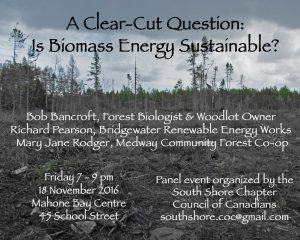 The Council of Canadians is sponsoring a panel discussion of a “Clear Cut Question”: Is Biomass Energy Sustainable?
The Council of Canadians is sponsoring a panel discussion of a “Clear Cut Question”: Is Biomass Energy Sustainable?
Panelists are Bob Bancroft, Richard Pearson and Mary Jane Rodgers. The discussion takes place Friday, November 18, 2016. 7-9 pm at the Mahone Bay Centre (45 School St. Mahone Bay). Bob Bancroft is a well known wildlife biologist and co-author of the 2010 Report Restoring the Health of Nova Scotia’s Forests who has argued that our forests are seriously overcut and that we need to give them a rest. Richard Pearson is a business person with a background in sustainable development who is promoting a small scale biomass energy project for Bridgewater. Mary Jane Rodger is with the Medway Community Forest Co-op.
View Report on the Meeting (In Lighthouse Now)
Monday Feb. 27, 2017: The Forested Wetlands Project
 A developing Forested Wetlands Project will be the topic of a presentation by Logan Gray and Sydney Bliss to Nova Scotia Wild Flora Society, 7:30 p.m. at Nova Scotia Museum of Natural History in Halifax; all welcome. View Details
A developing Forested Wetlands Project will be the topic of a presentation by Logan Gray and Sydney Bliss to Nova Scotia Wild Flora Society, 7:30 p.m. at Nova Scotia Museum of Natural History in Halifax; all welcome. View Details
“Forested wetlands are an important part of the broad coastal landscape of the Atlantic provinces. Although these habitats are likely to be as sensitive to disturbance as other wetlands, they have been overlooked and understudied. Because of the presence of trees and their more complex vegetation structure, forested wetlands are likely very diverse and and have distinctive aspects to their ecosystem functioning.
“The Forested Wetland Project, funded under the Atlantic Ecosystems Initiative, was initiated in 2016 through collaboration of [researchers at] Dalhousie, Mount St. Vincent and Memorial Universities. Its objectives are to “characterize biodiversity of different types of [Maritime] wetlands (structural, plant, bird, lichen, fungal diversity); relate different aspects of biodiversity in forested wetlands to assess their vulnerability to biodiversity loss; and to determine the role of forested wetlands in the carbon cycle by monitoring tree decomposition.
“The Nova Scotia Wild Flora Society is one of the NGO partners who are asked to provide input on locations of forested wetlands, identify interesting features and challenges and assist in the dissemination and discussion of results. It is early on in the project and this presentation is intended help to engage NSWFS members and others in the project. Logan Gray is the Project Manager for the Nova Scotia team, Sydeny’s focus is on birds.”
—————-
This project is a welcome initiative. Treed bogs and fens and wooded swamps are among Nova Scotia’s most common wetlands. No special approval is required for harvesting trees in these wetlands; minimal watercourse protection regulations apply (re: NS Wetland policy). In addition, roads through forested wetlands, and harvesting operations in the vicinity of forested wetlands can have serious effects on their functioning.
March 2,2017: Eastern Hardwood Conference
Port Hawkesbury Civic Centre,9:00 am – 4:30 pm
Advanced Registration Only
“The objective of the 2017 Eastern Hardwood Conference is to examine the potential of hardwood management as a mechanism to improve our local forests, communities and economy. We strongly believe that our hardwood resource is an under valued and recognized resource that could, with proper management, play an important roll in our regions economy. Various factors such as our changing climate, carbon markets, forest restoration objectives and the need for economic diversification point to our natural Acadian Hardwood Forests as a wise ecological and economic investment. This conference is for landowners, contractors, and anybody who takes interested in appropriate management of our hardwood resources.”
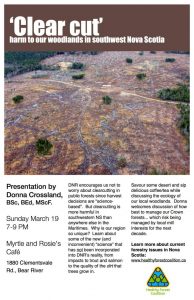 Sunday Mar 19, 2017: ‘Clear cut’- Harm to our Woodlands discussion
Sunday Mar 19, 2017: ‘Clear cut’- Harm to our Woodlands discussion
Presentation by Donna Crossland, BSc, BEd, MScF.
Sunday March 19, 2017, 7-9pm
Myrtle and Rosie’s Cafe
1880 Clementsvale Rd., Bear River.
DNR (The NS provincial Department of Natural Resources) encourages us not to worry about clearcutting in public forests since harvest decisions are “science-based”. But clearcutting is more harmful in southwestern NS than anywhere else in the Maritimes.
Why is our region so unique?
Learn about some of the new (and inconvenient) “science” that has not been incorporated into DNR’s reality, from impacts to trout and salmon to the quality of the dirt that trees grow in.
Savour some desert and sip delicious coffee/tea while discussing the ecology of our local woodlands. Donna welcomes discussion of how best to manage our Crown forests…which risk being managed by local mill interests for the next decade.
Item posted at bearriverarts.wordpress.com
Thursday, March 23, 2017 HABITAT: the forgotten need of birds in the much-acclaimed, science-based forest management of NS.
Donna Crossland talks to NS Bird Society.
Taking a bird’s eye view of Nova Scotia’s recent forest management practices, the “science” that is used by NS Department of Natural Resources to claim that forest practices are sustainable, and the science that is conveniently ignored. Time to ‘stop listing’ and ‘start speaking’ on behalf of bird habitat.
Donna Crossland was a National Park Warden for Parks Canada for 16 years. She is currently employed as a biologist at Kejimkujik National Park. Among her tasks, she conducts forest songbird surveys for Keji, as part of our forest monitoring program.
7:30PM Lower Auditorium, NS Museum of Natural History – All welcome
Open to the public and refreshments to follow.
Sat May 13, 2017: Donna Crossland on Our Forest Our heritage.
At Harbourville Hall, 2564 highway 360, Harbourville, Kings Co. Donna will do a brief presentation about the impact of wind and fire on our forests and will facilitate a discussion on strategies and solutions to encourage our lawmakesr to implement sustainable forestry in Nova Scotia.
Tuesday May 16, 2017: Environmental Issues Election Debate
May 16, 2017 | 10:00 – 11:30 AM, 6350 Coburg Rd., University of King’s College, New Academic Building, Alumni Hall
Tues May 23, 2017: Final Forestry Lab Summit
“Join us on Tuesday, May 23rd, 2017 at the Pictou Lodge (172 Lodge Rd, Pictou, NS), for our final summit to learn more about the work and accomplishments of The Forestry Lab. The project is guided by a diverse “core team” of forest stakeholders who have been investigating practical solutions to several of the sector’s most significant problems. Details about times and the agenda will be posted here as soon as they become available.” See Forestry Lab
MTRI hosting biodiversity workshop Fri July 14, 2017, Keji BioBlitz follows on 15th and 16th
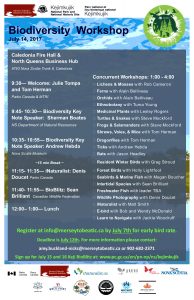 Events over 3 days hosted by MTRI and Kejimkujik National Park in SW Nova Scotia provide a great opportunity for people to learn more about and share their knowledge about the plants and animals around us.
Events over 3 days hosted by MTRI and Kejimkujik National Park in SW Nova Scotia provide a great opportunity for people to learn more about and share their knowledge about the plants and animals around us.
MTRI, the Mersey Tobeatic Research Institute, is based in Kempt, Queen’s County and is focused on biodiversity conservation and sustainable use of natural resources in the Southwest Nova Biosphere Reserve. The Biodiversity Workshop is their 6th annual science conference. It is being held July 14th at the North Queens Fire Hall in Caledonia, NS from 9:30am to 4pm. The workshop will cover 20 topics such as Ethnobotany with Tuma Young, Shrews, Voles, & Mice with Tom Herman, Forest Birds with Holly Lightfoot, Lichens and Mosses with Rob Cameron. View MTRI website for details, also on the poster at left, click on to enlarge).
Kejimkujik National Park is nearby and is hosting a BioBlitz on July 15 and 16. From the website: read more
To keep track of upcoming forestry-related events of all sorts, see www.rurallife.ca/events/.
Selected events are highlighted below.
Thursday July 20th, 2017: Nova Scotia Forest on a Crossroad
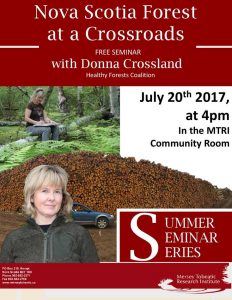 Donna Crossland, a co-author with Bob Bancroft of Restoring the Health of Nova Scotia’s Forests (2010), will be talking about forests and forestry in Nova Scotia in the Community Room at MTRI (Mersey Tobeatic Research Institute) on Thursday July 20th at 4 p.m.
Donna Crossland, a co-author with Bob Bancroft of Restoring the Health of Nova Scotia’s Forests (2010), will be talking about forests and forestry in Nova Scotia in the Community Room at MTRI (Mersey Tobeatic Research Institute) on Thursday July 20th at 4 p.m.
Donna Crossland was interviewed recently by CBC Halifax Information Morning in the 4th of a series on the state of forestry in Nova Scotia, and in particular controversies surrounding cutting on the Western Crown lands by the WestFor consortium.
Markus Zwicker, General Manager of WestFor Management Inc. who was also interviewed in the CBC series has been invited to talk about his perspectives sometime in the following weeks.
MTRI is a “non-profit co-operative with a mandate to promote sustainable use of natural resources and biodiversity conservation in the Southwest Nova Biosphere Reserve and beyond through research, education, and the operation of a field station.” It is located near Kejimkujik National Park. View directions on the MTRI website for how to get there.
Thurs July 28 – Sun July 30, 2017: Great Canadian Lumberjack Celebration
“The Municipality of Barrington would like to extend an invitation to you to attend our Canada 150 event, The Great Canadian Lumberjack Celebration. Put on your Lumberjack red plaid as we celebrate the importance of the lumber industry and our local lumberjacks and how they have helped shape our Nation and community. Nova Scotia has always had a rich history and culture in the logging industry, including the Municipality of Barrington. The Barrington River was used for log driving, sending logs down the river to be milled in large part for the shipbuilding industry in Nova Scotia.”
It begins on Friday, July 28 – 7PM with a Screening, Stories and Songs of The Last Log Drive
Backyard Forestry w/ Donna Crossland, Dale Prest & Jamie Simpson
July 28 – 30, 2017 at Harrison Lewis Coastal Discovery Centre
Participants in this year’s Backyard Forestry workshop will learn about basic forest ecology and how to work with a piece of land to encourage ecological and economical value. Topics covered will include: Identifying tree and shrub species, and their ecological roles in the forest; choosing which trees to cut and which trees to leave; how to promote wildlife habitat; what landowners can do to increase forest carbon storage; how our forests have changed, and what we can do to promote natural forests; what we can learn from natural disturbances in the forest; where to obtain funding for silviculture activities; legal issues such as wood theft and capital gains tax, and, the virtues of a “messy” woodlot.
Full price $325. $100 deposit required to register.
Registration is accepted up to two weeks before the workshop date.
Participants can also send any payments by cheque to 339 Sandy Bay Rd, East Port L’Hebert, NS B0T 1S0, or contact Dirk at 902-646-1554 for other inquiries about payment. (From H-L website)
Maximum 15 participants. Read more
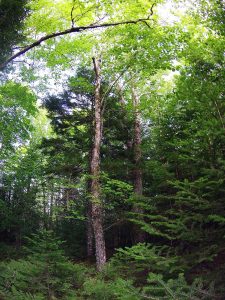
Multi-aged, mixed Acadian forest on a private woodlot in Nova Scotia provides many ecosystem services
MES Thesis Defence
GIFTS TO A FUTURE WORLD: CONVERSATIONS WITH WOODLAND OWNERS IN NOVA SCOTIA
By Andrew W. Kekacs
Abstract:
Private, non-industrial woodland owners provide more than half of the timber used by Nova Scotia’s forest products industry. Research, however, suggests many of these owners do not consider income from timber sales to be their primary reason for owning woodland. This study aimed to reach a holistic understanding of their attitudes and motivations using walking interviews on the owners’ woodlands and a grounded theory approach to analysis, in which explanations of the phenomena under study are induced from the data rather than being based on responses to survey questions or derived from a priori hypotheses. Forest landowners interviewed for this research were most concerned with the conservation – and ultimately the conveyance – of values that provide them with no immediate economic returns. The high value placed on these “gifts to a future world” offers a new way to think about the design of programs meant to encourage active management of private forestland.
Tuesday, August 1, 2017 @ 10:00 A.M.,
Room 5001, Kenneth C. Rowe Management Building
6100 University Ave., Halifax, NS
From Andrew Kekacs LinkedIn profile (publicly available)
– Executive Director of NSWOOA Mar 2012-present
– Communications Director, Small Woodland Owners of Maine, 2007-2010
… University of Connecticut, BA in Journalism (1982); graduate level studies in economics at Trinity College, Hartford
“The [MES degree at Dal] builds on 30 years of experience in natural resources and sustainability issues. My thesis looks at the changing beliefs and motiviations of people who own small forested parcels in Nova Scotia. Other areas of study include environmental and social impact assessment, biodiversity conservation, and environmental informatics.”
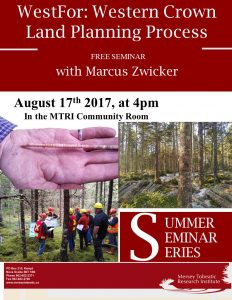 Marcus Zwicker, General Manager for WestFor, the consortium of mills managing the Western Crown Lands, will speak at the Mersey Tobeatic Research Institute at 4 pm, Thurs Aug 17 as part of MTRI’s Summer Seminar Series.
Marcus Zwicker, General Manager for WestFor, the consortium of mills managing the Western Crown Lands, will speak at the Mersey Tobeatic Research Institute at 4 pm, Thurs Aug 17 as part of MTRI’s Summer Seminar Series.
These seminars are being live streamed and archived on the MTRI Facebook Page.
Amongst recent seminars:
– On Aug 10, MTRI’s Jason Henry and Lori Phinney talked about Chimney Swifts, Swallows and Bats (“Bugged Out“).
– On July 20, Forest Ecologist Donna Crossland talked about The State of Nova Scotia’s Forests.
We can expect to hear a fairly different perspective from Mr. Zwicker. Zwicker and later, Crossland were interviewed earlier in the summer on CBC Information Morning.
View posts on this website citing WestFor for some further background, news stories about WestFor.
“MTRI is a non-profit co-operative with a mandate to promote sustainable use of natural resources and biodiversity conservation in the Southwest Nova Biosphere Reserve and beyond through research, education, and the operation of a field station.”
MTRI is located at , 9 Mount Merritt Road, Kempt, Queens County, Nova Scotia.
View their Contact Page for driving instructions.
– Thurs Oct 19, 2017: Nova Scotia Healthy Forest Coalition to hold a “Forest Funeral”
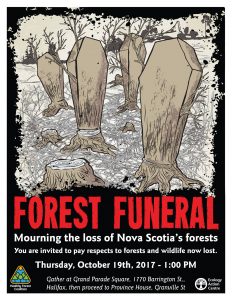
Poster on the Forest Funeral Event Facebook Page
You are invited to mourn our forest losses with citizens from across the province.
Please come to pay your respects to the once great Acadian Forest.An ‘open casket’ of tiny ‘logs’ will be followed by a procession of wildlife that have died through drastic losses of habitat. Pall bearers and forest mourners will walk from Grand Parade Square to the funeral ceremony at Province House. From there, the bodies will be carried to the very origin of forest mismanagement, the NS DNR office on Hollis Street.
– On Oct. 21, 2017: Nova Scotia storyteller and local historian, Mike Parker, will be in Caledonia at the North Queens Business Hub giving a talk entitled Nebooktook – In the Woods. View Queens Co. Advance “The hub invites anyone and everyone to come and enjoy the story of Nova Scotia’s forest with Mike Parker on Oct. 21 from 7-8 p.m. at 9793 Highway 8, Caledonia. The event is free, but it is suggested that people RSVP through email or the Facebook event so organizers can ensure there is enough seating.”
– Dec 4, 2017: Donna Crossland: A “clear cut” Perspective About “science-based” Forest Management in NS
Time: 7:30pm
Location: Acadia University, KC Irving Centre Auditorium
Speaker: Dr. Donna Crossland
Forest Ecologist, Resource Conservation Officer II
Kejimkujik National Park (Parks Canada)
Title: A “clear cut” Perspective About “science-based” Forest Management in NS
Over two decades, Nova Scotia’s forests are extensively clearcut. Is forest management really “science-based”? Does scientific guidance negate the need to reduce clearcutting by 50%? Satellite images reveal forest cover loss. Ecologically, impacts from forest management practices are far-reaching, even severe. NS’s soil nutrient levels are among the poorest in North America and cannot sustain these practices. The result? Displaced & homeless wildlife and rare native forests. We’re surpassing ecological limits toward ecological collapse.
…
